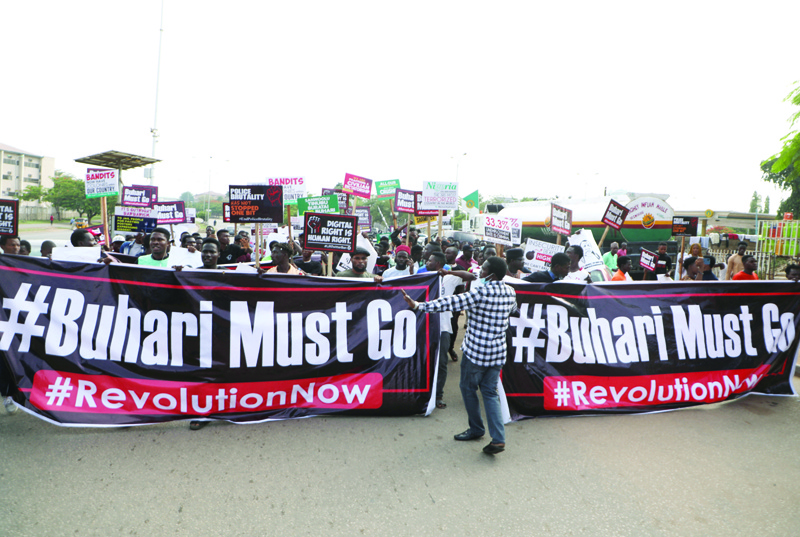 ABUJA, Nigeria: Protesters hold a banner during a demonstration in Abuja yesterday, as Nigerian activists called for nationwide protests over what they criticize as bad governance and insecurity, as well as the recent ban of US social media platform Twitter by the government of President Muhammadu Buhari. - AFP
ABUJA, Nigeria: Protesters hold a banner during a demonstration in Abuja yesterday, as Nigerian activists called for nationwide protests over what they criticize as bad governance and insecurity, as well as the recent ban of US social media platform Twitter by the government of President Muhammadu Buhari. - AFP
KANO, Nigeria: Armed cattle thieves have killed 53 people in northwest Nigeria's Zamfara state, police and local residents said yesterday, the latest violence to hit the restive region. Scores of motorcycle-riding gunmen called bandits by locals on Thursday through Friday, invaded the villages of Kadawa, Kwata, Maduba, Ganda Samu, Saulawa and Askawa in the Zurmi district, shooting residents, they said.
The gang attacked farmers in their fields and pursued others who fled to escape the assaults. Zamfara police spokesman Mohammed Shehu said 14 bodies had been taken to the state capital Gusau on Friday, and added that "policemen deployed in the area following the attacks." Local residents said 39 more bodies had been recovered and buried in the neighboring town of Dauran. "We recovered 28 bodies yesterday and 11 more this morning from the villages and buried them here," said Dauran resident Haruna Abdulkarim.
"It was dangerous to conduct the funeral there because the bandits are harboring in the Zurmi forest and could return to attack the funeral," said another resident, Musa Arzika who reported the same death toll. Villages in the Zurmi district have been repeatedly raided by bandits, and local residents blocked a major highway last week, calling on the authorities to end the attacks. Northwest and central Nigeria have in recent years fallen prey to gangs of cattle thieves and kidnappers who raid villages, killing and kidnapping residents in addition to stealing livestock after looting and burning homes.
The criminals have begun to focus on raiding schools and kidnapping students for ransom. More than 850 students have been abducted since December but most have been released after ransom payments. The gangs are largely motivated by financial gains and have no ideological leanings but there is growing concern of their infiltration by jihadists from the northeast waging a 12-year-old insurgency to establish an Islamic state. Military operations and amnesty offers have failed to end the attacks. In a broadcast on Friday, Zamfara state governor Bello Matawalle urged residents to defend themselves against "killer bandits."
Anti-government protests
Nigerian police yesterday fired tear gas to disperse anti-government protests in the commercial city of Lagos and the capital Abuja, injuring some people and arresting others, AFP reporters said. Nigerian activists had called for nationwide protests over what they criticize as bad governance and insecurity, as well as the recent ban of US social media platform Twitter by the government of President Muhammadu Buhari. The protests were the first to take place simultaneously in several cities since the #EndSARS movement against police brutality in October grew into the largest anti-government rallies in Nigeria's modern history.
Hundreds of protesters gathered yesterday in Lagos, a sprawling megapolis of over 20 million people, and police fired tear gas to disperse the crowd. The protesters carried banners and placards saying "Buhari Must Go", calling for reforms. In Abuja, a similar scenario played out as the protesters gathered as early as 7.00 am.
A detachment of police and army broke up the crowd using tear gas, AFP reporters at the scene said. Some journalists were harassed by the security forces, they said. Police had said the protests were unauthorized and AFP reporters said they saw several people being detained. There were also pockets of protests in Ibadan, Osogbo, Abeokuta and Akure, all in southwestern Nigeria.
Buhari, a former general first elected in 2015, has been under pressure over growing insecurity in Africa's most populous nation, home to more than 200 million people. Security forces are battling a jihadist insurgency in the northeast, a surge in mass kidnappings and attacks by criminal gangs in the northwest and a rise in separatist tensions in the southeast.
The government also triggered an outcry a week ago when it indefinitely suspended Twitter in the country, saying the platform was used for activities aiming to destabilize Nigeria. The UN, Nigeria's Western partners and rights groups all condemned the move as a blow to freedom of expression.
Yesterday's demonstrations were called to coincide with "Democracy Day", marking the anniversary of Moshood Kashimawo Abiola's election as Nigerian president in 1993. Abiola's victory was annulled by the then military government, plunging Nigeria into months of civil unrest. Nigeria returned to civilian rule on May 29, 1999, but Buhari chose June 12 as Democracy Day after becoming president to honor Abiola and other heroes of the struggle. - AFP









